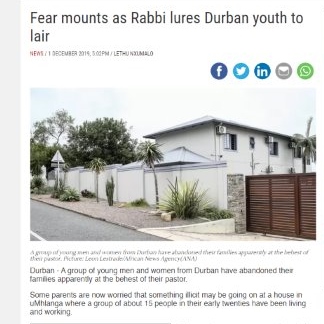
Featured Item

Fake rabbi headline causes distress
JORDAN MOSHE
Such was the case in Durban this week, when the Sunday Tribune’s headline seemed to be reporting about a rabbi’s misconduct, when in fact the individual in question wasn’t even affiliated to Judaism.
In spite of its headline, the article was about a group of young men and women from Durban who abandoned their families at the behest of a local pastor, Siza Madlala, the founder of a church known as the House of Grace International. Their worried parents spoke to the newspaper, sharing concerns about illicit goings on at a house in uMhlanga where a group of young people committed to Madlala has been living and working.
Madlala is referred to as “rabbi” by his followers, according to the article. However, the article’s headline, along with repeated reference to Madlala as “rabbi” without quotation marks, has caused considerable confusion and concern.
The Cape South African Jewish Board of Deputies (SAJBD) criticised the newspaper for its “poor and misleading headline” on Facebook on Monday. It suggested that the oversight could cause damage to the Jewish community.
The SAJBD KwaZulu-Natal Council sent a letter to the editor on Tuesday, which prompted a meeting with acting editor, Sandile Mdadane, on Wednesday morning.
“Mdadane apologised, and committed himself to making it right as soon as possible,” council head Jeremy Droyman says. “He really went out of his way to make us feel comfortable and resolved to fix the issue. The newspaper has promised to set the record straight, and it is falling over itself to make it right.”
Droyman says that the newspaper recognised the insensitive nature and damaging potential of the headline, saying that it also appeared on newspaper headline boards affixed to street-side lampposts in Durban. “The article’s headline poses a problem by referring to a rabbi, a title people associate with a Jewish spiritual leader. There’s no rabbi involved in this case. The boards were even more problematic, as unlike the article, they had no context at all. It has the potential to be interpreted as anti-Semitic.”
This concern was echoed by others.
“The false headline of the Sunday Tribune is an unethical and irresponsible breach of basic journalistic integrity,” says Chief Rabbi Dr Warren Goldstein. “It damages the reputation of the Jewish community. The Sunday Tribune must take appropriate and urgent action to rectify the damage.”
Anton Harber, adjunct professor of journalism at the University of the Witwatersrand and a respected former editor agrees, calling the headline a “disgrace” with damaging potential.
“It’s inaccurate, damaging, perhaps even dangerous,“ he says. “It should have read, “Fake rabbi” at the very least. It shouldn’t have gone to press without comment from the rabbinical community to make it clear that this person is not part of that community.
“It’s disturbing that this kind of amateurish work can get into a major mainstream newspaper. Unfortunately, this paper belongs to Iqbal Survés’ Sekunjalo Independent Media group, which has gone rogue. It has turned its back on the media council/media ombudsman self-regulatory oversight system, so it’s operating outside of industry norms and without accountability. It’s an embarrassment to journalism.”
Nevertheless, the Sunday Tribune has recognised its error of judgement. Mdadane told the SA Jewish Report that their meeting was productive, and that the council’s letter would be featured in this weekend’s edition of the newspaper along with a follow-up article.
“We recognise fully that it was a mistake,” he says. “We see that ‘rabbi’ refers to a Jewish spiritual leader, and recognise that we could have used the label in quotation marks to reflect that he isn’t associated with Judaism.”
However, he stressed that the article itself was important. “It was based on the concerns of parents whose children have been alienated from them because of the pastor. We can’t ignore that his followers call him rabbi.
“We have been offered an opportunity to learn,” says Mdadane. “Journalism isn’t an exact science. We are human beings, and I don’t believe we are unteachable. We need to learn from our mistakes.”




